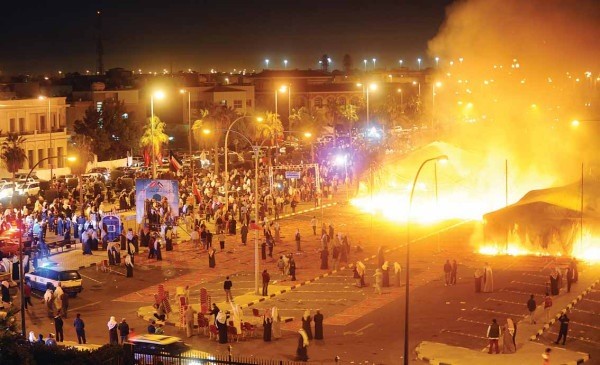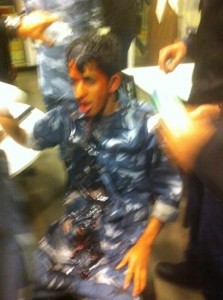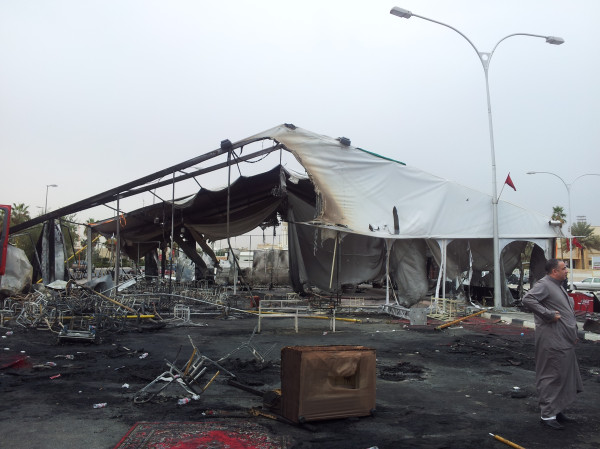This post is part of our special coverage on Refugees.
Today, 3 February, 2012, Kuwait will hold its parliamentary elections divided by five electoral districts, a system that was only passed in 2006 in response to blogger-led protests.
At the beginning of December 2011, two year-long protests previous led to the replacement of Prime Minister Nasser Al-Mohammed with his cousin Jaber Al-Mubarak and to the dissolution of the parliament for the fourth time since Al-Mohammed was first appointed. Since then, candidates have been working their ways towards reaching voters.
Tribal rage
Mohammed Al-Juwaihel, a candidate who tried his luck last elections but was removed for bribing voters, has always been a controversial person in Kuwaiti society. He went on television several years ago lunching an attack on those who have dual citizenship, comparing them to a sort of parasitic plant with no loyalty to the country, who should be stripped off their Kuwaiti citizenship.
He has also used the same language with the Kuwaiti stateless Bidun community and attacked certain Kuwaiti tribes, some of whom in response have attacked him in return.
On Monday 30 January, Al-Juwaihel gave another speech insulting one of the tribes, Al Mutair, saying he “will step on them”. After his speech, hundreds of Al Mutair tribes people went to his election tent hub in the Al-idailiya area, chanting, ripping up the posters depicting his slogan “Kuwait is for Kuwaitis.. only”, and at last burning the tent.
In this video uploaded to YouTube by yasoo1985, one can see the attack on Al-Juwaihel's center, with tribesmen setting it on fire, celebrating and chanting with threats:
Pictures uploaded by Flickr user Yasoo85, show the crowd as they burn the center.
A picture uploaded to Twitter by @Abd_Rashed also shows the center on fire, from another angle:
This picture, posted on Twitter by @hwazn, shows a security guard bleeding during the events:
This picture (uploaded by a Twitter parody account @Murad_ALm9ri) shows the center the following morning:
The following day, some citizens showed support to Al-Juwaihel by leaving flowers near the burned center (image uploaded by Twitter user @Nasser_Aleidan):
Attacks on media
On Tuesday, the tribesmen were not satisfied with their Monday attack and headed to scope TV channel to try to break in; they failed after being blocked by security guards. The crowd of protestors were upset that the television station broadcast Al-Juwaihel's insulting speech against their tribe.
Afterwards, they tried to attack another station, Al-Watan, as it was hosting two election candidates in a debate. One of the candidates, named Nabeel Al-Fadil, uses the same discriminatory approach as Al-Juwaihel.
The station stopped the debate but that did not hold the crowd back and the attack led to 15 injuries among security guards, according to local newspapers, and three injured journalists – Yousif Al-Mutairi from Al-Qabas newspaper, Mohammed Al-Sharhan Al-Jarida (who was previously attacked by security and detained during stateless protests) and a photojournalist from Al-Seyassah newspaper.
Here is a clear picture of crowds standing in front of Al-Watan TV, taken from Al-Qabas:
This picture shows the car of candidate Nabil Al-Fadil, after being smashed in by the enraged crowd:
Vote For Kuwait
Since the parliament was dissolved, many Kuwaitis have relied on Twitter to discuss their choices or to promote certain candidates. Last elections, Facebook played a big role in elections campaigns, but in this round, Twitter is playing the essential role as it transports faster and reaches a wider audience.
Last November 2011, a group of civil rights advocates named ‘South Al-Kuwait’ (The Voice of Kuwait) started a campaign to promote awareness about the national constitution and what rights it guarantees to protect one from discrimination and injustice. For the current elections, the group made the following video to promote their campaign ‘tafreg’ (it differs) to encourage people to vote and help make a difference:
A week ago, a group of actors created short videos entitled ‘Sheno ya3ni TV‘ that make fun of election candidates and their deception or shallowness. Some of the videos are directly made about certain candidates. In this video, for example, they make fun of a particular female candidate who does not have a clue about politics and only cares about her expensive clothes:
http://www.youtube.com/watch?v=ZB0hL1W6ffI
While this video shows Nizar Al-Qandi playing the typical candidate who is running for elections to gain more power and money:
http://www.youtube.com/watch?v=4SF9DbtuuKY
Another campaign was launched to call on people to monitor elections and not allow violations:
To get the latest updates on Kuwait's elections, follow the hashtag #ommah2012
This post is part of our special coverage on Refugees.












